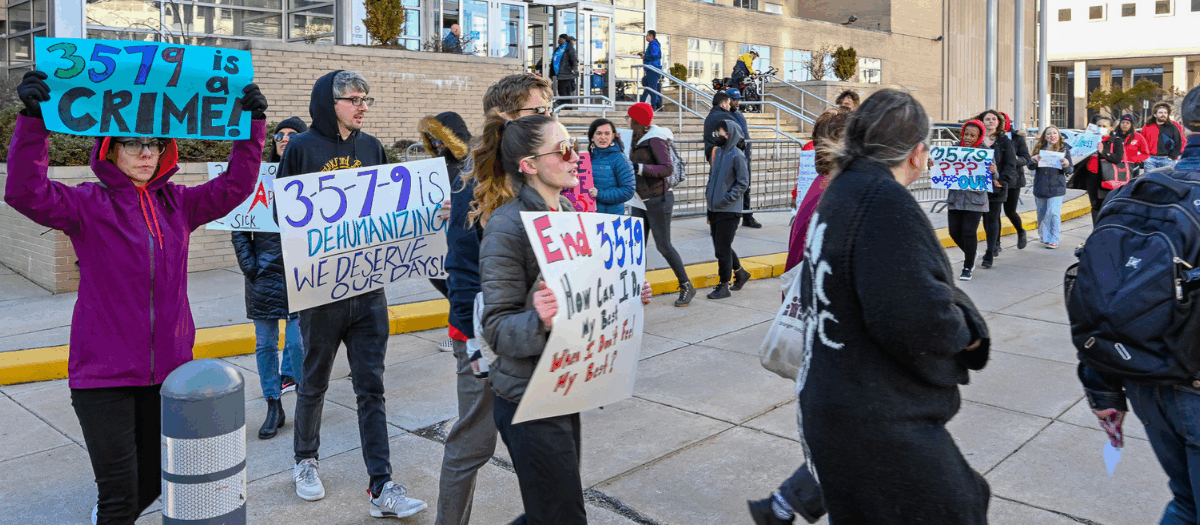Hroncich + LeBlond: Academics and sports — why isn’t it all about the kids in Pennsylvania?
Erik Gibson awoke that chilly November 2020 morning excited — and a little nervous. Most of all, he felt relieved. The weight on his shoulders felt a lot lighter.
That morning was Erik’s first day at a new school, Bishop McCort Catholic High School in Johnstown, Pennsylvania.
Erik had previously attended Forest Hills High School, his zip-code-assigned district school. As a student-athlete, Erik added both academic acumen and athletic ability to Forest Hills’ student body. The school’s wrestling team advanced to the 2019 playoffs, aided by Erik’s third-place finish. Forest Hill saw Erik, a two-time state placewinner for the Rangers, as a top contender for the state championship in 2021.
But the relationship between Erik’s family and the school began to fall apart in late 2019. A teammate showed Erik an inappropriate video, which led to an altercation that ended in the teammate calling Erik, who is black, a racial slur. Forest Hills did not notify Erik’s parents. In fact, the administration didn’t meet with them until months after the incident. Erik says teachers and fellow students bullied and harassed him after the incident became more widely known.
This wasn’t the first time Erik had experienced adversity. Erik was orphaned at a young age; he and his siblings were adopted by their aunt and uncle, Ashley and John Miller. Despite life’s challenges, Erik thrived, eventually earning a scholarship to Ivy League Cornell University.
The broken trust at Forest Hills was too much for the family to accept. According to Erik’s mom, her kids left their assigned public school because she “didn’t feel like it was a safe environment for them anymore.”
Erik found his new home at Bishop McCort. Despite the circumstances surrounding his transfer, he accepted missing one year of post-season competition due to the Pennsylvania Interscholastic Athletic Association’s (PIAA) rules for transfers. He is, after all, a student athlete — emphasis on student first.
But Erik’s family wasn’t the only one in the Johnstown area to switch schools during the pandemic. According to principal Tom Smith, 88 students transferred to Bishop McCort after March 2020 — something that Smith attributes to the school’s academic excellence and an unwavering commitment to keep its doors open. McCort operated for 84 percent of its regularly scheduled days during the 2020-2021 school year. While the neighboring schools were closed for all students, Bishop McCort instead launched a robust virtual learning program for anyone who wasn’t comfortable with in-person learning.
This large number of transfer students doesn’t surprise Erik and his parents. They were incredibly grateful for the academic opportunities offered at McCort after Forest Hills’ lackluster performance during Covid-19. According to Erik, during quarantines he received only a small packet of homework, which he would complete by 9:00 a.m.
READ MORE — Bill to increase caps on school-choice tax credit programs clears Pennsylvania Senate committee
Interestingly, there’s no evidence that having so many students transfer for academic reasons bothered school leaders. In fact, high student turnover in the area extends beyond Forest Hills and predates the pandemic. Greater Johnstown Superintendent Amy Arcuro is on record noting that high student turnover is “a way of life” and has been for as long as she can remember.
But nineteen of the students who transferred to McCort in total were wrestlers — fourteen of those from Forest Hills. This angered district officials, so they filed a complaint with PIAA.
Last month, Bishop McCort athletes were whacked with a two-year postseason ban and a three-year probation. According to the PIAA, Bishop McCort is guilty of violating the organization’s recruiting rules.
For the Millers, the ruling feels one-sided. Though it is a private entity, PIAA’s District 6 committee, which issued the ruling, is stacked with local public school leaders, including the Forest Hills athletic director. Bishop McCort does not have a seat on the committee, though the school has attempted to gain one in past years. Additionally, the committee did not ask Erik and his parents to testify on their own behalf.
A cynic could see this as a reprisal from rival schools against McCort for keeping their doors open and thereby gaining new students. But it’s the kids who are hurt by this decision.
As Ashley Miller puts it, “I feel like we’ve been punished for doing what’s best for our kids.”
If children were treated as individuals, instead of as property of the district in which they happen to live, many of these conflicts could be avoided.
Mrs. Miller is a public school teacher, but she believes parents need flexibility in determining where and how their children receive an education. “I think that school choice is very important. Not every single school fits every single child,” she says.
Unfortunately, the current K-12 education system upholds a government monopoly that assigns students to schools based on where they live rather than what would be best for them. This forces conflicts, as diverse people with diverse needs then must fight to ensure their definition of what is best wins. PIAA rules — designed around that system — limit kids in their athletic opportunities when they opt to leave their assigned schools.
If children were treated as individuals, instead of as property of the district in which they happen to live, many of these conflicts could be avoided.
Erik’s been through a lot, but his outlook is amazingly positive despite all the challenges he’s faced. He plans on moving to Cornell early to get away from the PIAA distractions and focus on his future. But it’s sad to see his high school experience — and the sport that he loves — so unfairly disrupted by policies that don’t put students first.
When Erik reflects on his first day at McCort, he says it was a very good day. “I felt like my new start was very needed. Now I’m able to hold my head high, knowing this was the best choice.”
A very good day and the best choice. That should be what we want for all children.
Colleen Hroncich is a policy analyst at the Cato Institute’s Center for Educational Freedom. Marc LeBlond is a senior policy analyst at the Commonwealth Foundation, Pennsylvania’s free-market think tank.





What else is new? The government trying to control our EVERY move; even to the detriment of our children! Criminals!